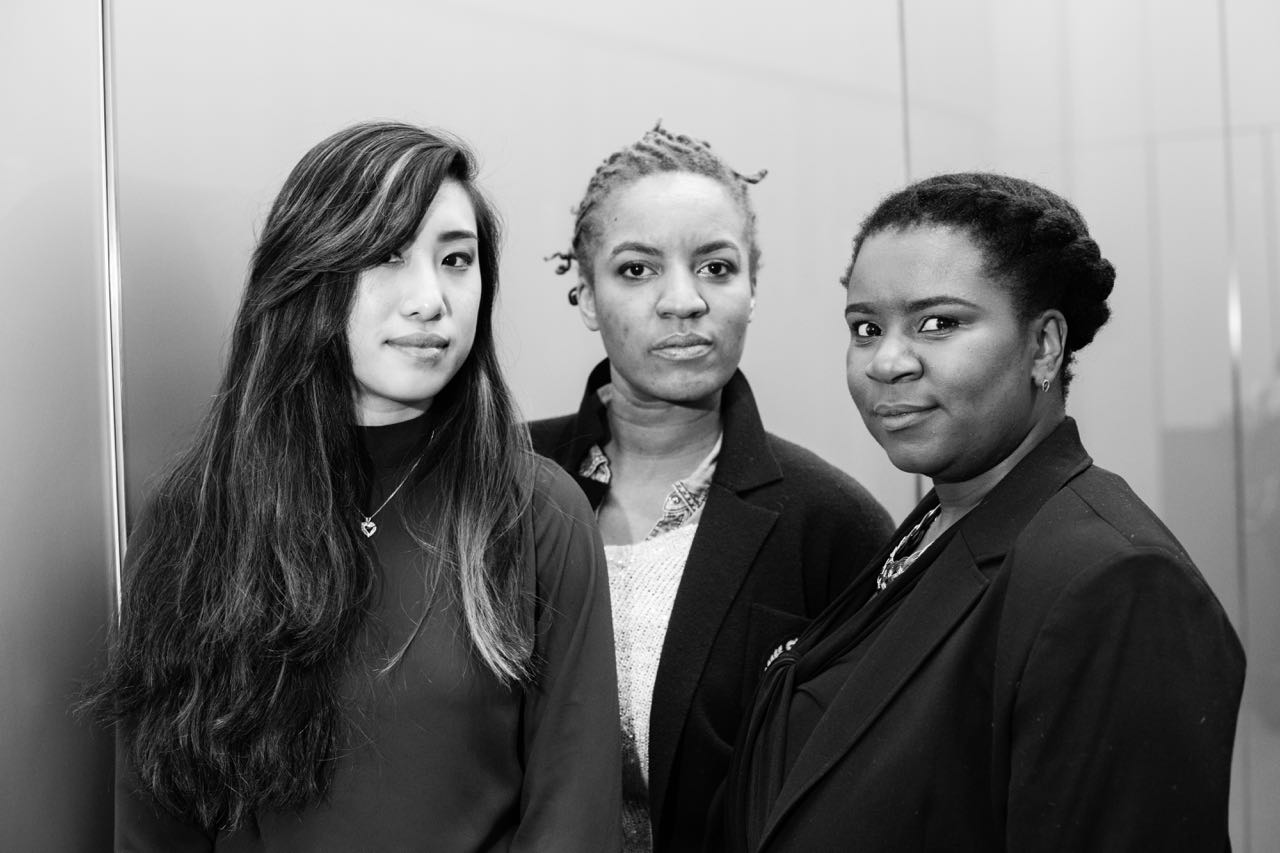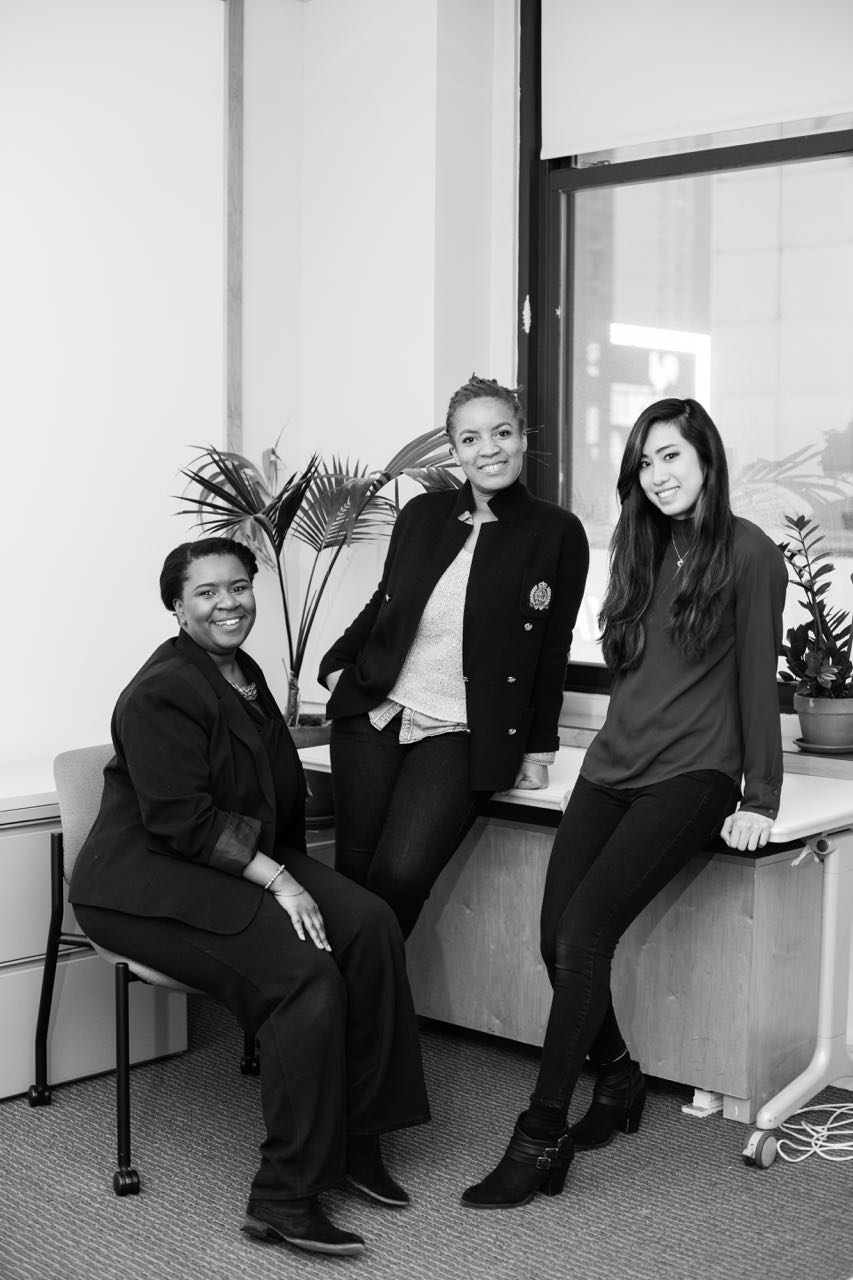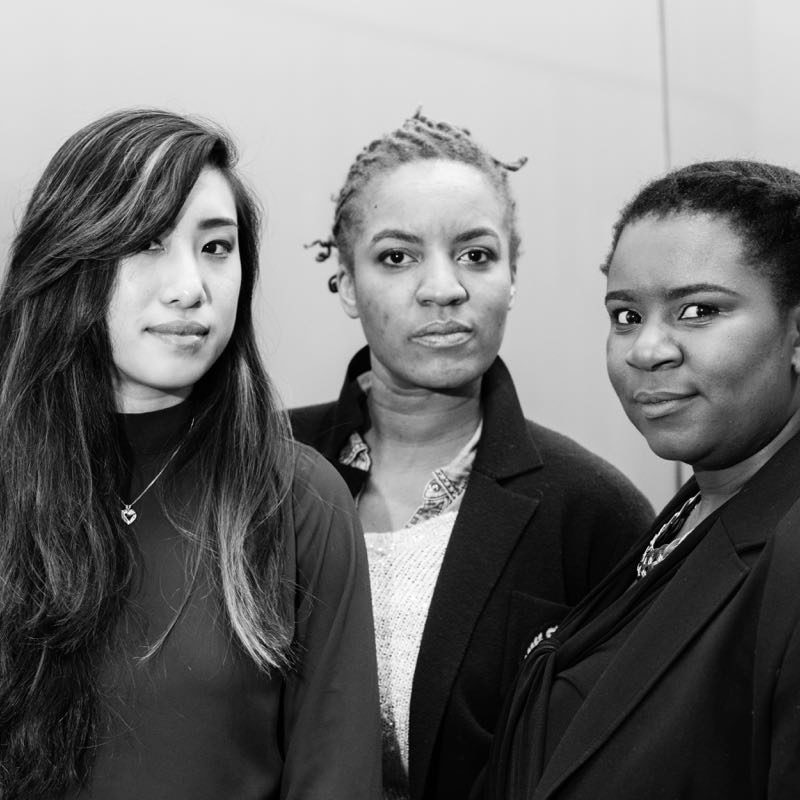Meet Three Women of the Broadway League’s Diversity Initiative

Photography by Tess Mayer
August 10th, 2018
In recent years, as conversations surrounding the increased need for diversity on stage have gained attention and traction, there have been some quieter initiatives to address the lack of diversity among people working behind the scenes in theatre. One such initiative is the Broadway League’s Diversity Initiative Internship program in conjunction with the Association of Theatrical Press Agents and Managers. The program places college students with internships at company and general management firms. Here, three recent participants in the program—Sophie Anicival-Wolak, Jacqueline Bell, and Joyee To—share their experiences.
On their backgrounds and how they got involved with the Broadway League:
Joyee: I am originally from Orlando, Florida. I was at the University of Central Florida studying in the BFA program for stage management. I was part of the Broadway Diversity Initiative here at the Broadway League. I started out on an internship—it was a week-long internship with company management for Cinderella. I moved to New York about two years ago, and I started freelancing, doing stage management gigs Off-Broadway, and then I moved into production, working on various Broadway shows, like In Transit. Then I got in contact with the Broadway League. Again, they reached out saying, “Hey! We’d like to get all the alumni together.” It was great. We had their luncheon, and they introduced this fellowship, also through the diversity initiative. That’s when I was put in contact with Disney Theatrical Productions. Through the Broadway League, I was put on this fellowship for six months with Disney Theatrical. It was, honestly, the greatest and most memorable experience I’ve had living in New York. That really jump-started my career as a working professional.
Jacqueline: I am also originally from Orlando, Florida. I joined the internship in 2013, where I worked on Flashdance the Musical, working directly with the company manager for about a week, where I was able to shadow him and assist him in multiple aspects of the production. Through there, I was able to spend a lot of time with cast and crew, as well as the company manager, and formed connections within that time. In 2014, I moved to New York City and some of the relationships during that internship actually transferred over to New York. I was able to stage manage the Broadway Sings series, which I have been doing ever since. That was a direct connection through the diversity initiative. In December of 2016, we got the invite to have all of the past interns meet up and have this luncheon at Sardi’s, and through that we were given the opportunity to connect with people who’ve had a very similar path to us and who also had the same opportunity. Then, of course, we found out about the fellowship. I was placed with Foresight Theatrical, the general management firm, and I was able to work on a number of shows including The Band’s Visit on Broadway, as well as working with a multitude of shows in various stages of development. Now I produce theatre and I am currently in the Commercial Theater Institute’s 14-week program.
Sophia: I’m originally from France. I grew up in Paris. I’ve been in New York on and off for the past ten years. I was working in the corporate world before coming to theatre. I was out of the country working the corporate life, having a corporate job in marketing and communications. When it came time to come back to the US, I knew that I wanted to work in theatre and did my best to do that. The way I did that was to find out about the Broadway League. I was, actually, the first person in New York to do the internship, because all of them had happened previously out of town and in regional theatres or on tour. I was able to do this program here on Broadway, and I shadowed the company manager on Paramour, working with a great GM office, Bespoke Theatricals. After that, I did the CTI 14-week course. It led me to being a fellow at Manhattan Theatre Club.
On how they realized their career path was actually a path:
Jacqueline: I did what a lot of people do, where they go through middle school and high school and are part of the drama club and do the school plays. Despite starting my life convinced that I was going to be on a law track, I threw all of that away and went to school for theatre. As an actor and performer, I also got hit with a dose of reality that maybe it wasn’t necessarily the right avenue for me, but I didn’t know where to go. I got into more of the production and administration side of theatre because I was short a credit. I went to the Dean of Fine Arts and he suggested a selected studies in stage management, which is basically just a made-up course. It’s, hey, you ASM this show, we’ll give you this college credit. I ASM’d my first show and I was absolutely horrible at it. Then I ASM’d the next show, which was for an outside company, it was called Yowa Dance, out of central Florida. What was really nice about that was that they sort of came in and completely disrupted the status quo. They really raised expectations and made me feel that there was a much more grand world out there in the theatrical space. I worked with them for about four years. Then I eventually landed with a company called Florida Theatrical Association. They are a part of the Broadway Across America touring series.
Joyee: I was introduced to theatre by accident, because I wanted to join the choir program in my high school, but then they were like, “No, we cut that program.” Because of budget cuts, that was the first to go. They put me in a musical theatre class and my guidance counselor said, “Yeah, it’s totally the same thing. Go ahead, do it!” Didn’t realize that meant acting, singing and dancing, and that was definitely not my forte. I kind of got roped into doing more of the technical side of stuff—I started building sets, learning more about production. I eventually I got put in charge of all those things. They introduced to me this role, stage manager, and I began to explore what being a stage manager meant, and I had a mentor that was a grade older than me. It was just what I wanted—something that didn’t have to quite deal with being on stage, but still being part of that magic that happens, that we create, in doing theatre. I went to college and didn’t quite know what I wanted to do and I learned that at University of Central Florida there was a theatre program and there was a track for stage managers. I did more research about it. I went to go see the shows and I just realized I missed doing theatre. Just knowing there’s an option of pursuing it as a career, in doing what I always wanted to do. Even though it’s not quite what my parents wanted me to do, I wanted to do something that was going to make me happy for the rest of my life.
Sophia: The performing arts has always been a passion. I went to undergrad and I went to business school here in New York. When I did my undergrad, one of the projects was to do whatever you wanted within the timeframe that they gave you. What I did was produce a musical. I gathered a group of friends and just told them, “You know what, I don’t know how to act. I don’t know how to dance. I don’t know anything, but I have a vision. Let’s do it.” They were like, “Yeah, okay.” We did it and performed it in front of our business school friends. That was a good experience. I never contemplated the idea of being an actor. I’ve never been an actor. I’ve never been a dancer or singer. It’s always been just producing.
On advice they’d give to people mentoring young professionals:
Joyee: It’s just to be open to opportunity, because you never know who this person is going to end up being. Just putting yourself back into how you started and keeping that in mind. Being open to communicating and just offering as much advice and you would have wanted when you just started.
Jacqueline: I definitely agree that you never know where someone is going to end up. You may meet someone when they’re young and green and they could be the next whomever or they could be the next Broadway star or what have you. But also, when you see someone who has that light in their eyes, be open to nurturing that. I know for me, a lot of things I wouldn’t necessarily have done on my own if it wasn’t for someone being like, “Hey! You should do this.” So when you find someone who has that special thing, be open. We all deserve a chance. Everyone deserves a chance. None of us would be here if someone didn’t give us a chance.
On the challenges of moving to New York and living in the city:
Joyee: Getting used to the winters here was one thing. But also getting used to the pace of the city. It’s getting used to the culture and getting used to the pace of how everyone works here. That was part of my struggle. I remember my first week here, I was just so overwhelmed. I had to kind of open myself up and accept it. This is going to be it. This is how you’re going to live and it’s kind of its own culture that you have to get used to. It’s not a terrible thing, it’s just something different from what I grew up in.
Jacqueline: The only thing that was really hard was real life. Understanding the major differences in cost of living and how most of my struggles turned out to be completely financial, because I just didn’t understand why everything cost so much. There was so much of that. When you get into spheres where you are trying to pursue a career, but then also trying to eat and live and not sleep on the subway. You have to make choices and you have to make sacrifices. I actually remember about two months into moving here, I got a great internship and I had to quit. I could not afford to stay there. I remember bawling my eyes out because of this wonderful opportunity and these great people. I had to walk away because I had to realize that I didn’t build a foundation yet. That was really, really, really hard when I first moved here. But then now, whenever I go home to Florida, everything’s so cheap.
On their biggest hurdles at this point in their careers:
Joyee: Finding my place in the city. I think my biggest hurdle was becoming a New Yorker and also finding the right place for me, in terms of my career. Just deciding what was best for me. Was it to pursue the thing that I came here for originally? Going into theatre, freelancing? Or to just fall back and settle for something where I can afford to do things? Making that decision and continuing to pursue my passion and the reason why I came here was probably my biggest hurdle.
Jacqueline: I think my biggest hurdle right now is processing and properly coping with fear. I feel that I am at a bit of a crossroads in my life, where things can go potentially really well and success could be very close. However, I’ve always struggled with the fear of success. I don’t know why this is, but I’ve never been a person who has found failure to be fearful, because failure is familiar. Everyone knows what it’s like to fail and fall flat on your face. It’s so easy. What does it mean to succeed? What does it mean to go after your dreams and actually having series of goals on a checklist and checking them off?
On their professional goals and dreams for the next few years:
Jacqueline: My goal is to produce on Broadway regularly. I just want to be a regular name in the industry. I want to be established and respected. I want to be an established Broadway producer. But not only that, I want to have multiple works that tour, not only the national but international markets. I have two ultimate goals.[One], to expand the global market of the Broadway industry. I feel that there are many areas of the world that are untapped, but have very rich cultural centers. For example, there is a lovely town called Almaty, Kazakhstan, which has a very rich arts and cultural environment. But there’s no Broadway in Kazakhstan, so why not? It’s definitely a goal to expand the global market. Then after that, in my later years, I have this master plan of putting up a performing arts school. I want to bring the tools, resources, and access that someone can get in New York City and Broadway and bring them into smaller towns and form these little chapters.
Joyee: I’m not entirely sure anymore. My original goal in moving here was to be a production stage manager on Broadway for a show that I cared deeply for. That has changed a little bit since I’ve moved here, only because I was introduced to all sorts of different roles that play into the Broadway world and theatre itself. I think I just see myself in a more administrative role. I have found a deep admiration for this diversity initiative itself. At Disney, as well, that diversity is such an important thing. I think continuing that effort in various part of the theatrical world and everywhere else will probably part of my plan as well.


